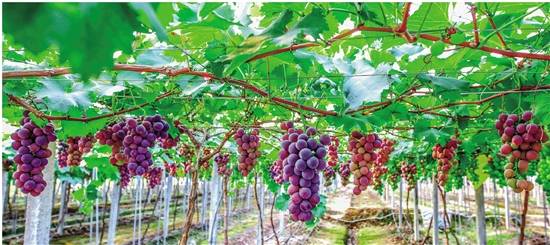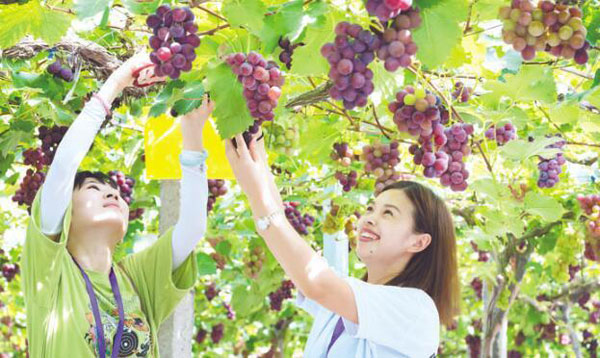Innovative management boosts grape industry in Pujiang county, E China’s Zhejiang
Modern infrastructure and logistics have boosted the grape industry in Pujiang county, east China’s Zhejiang Province, improving the quality of local grapes and expanding sales channels for grape farmers.
Sales of grapes are the main economic contributor to Pujiang’s agricultural sector. There are nearly 70,000 mu (4,666 hectares) of grape planting area in the county. The local grape industry comprises 150 cooperatives, 560 family farms, and over 10,000 farmer households, with over 100,000 locals working in the industry.
However, local farmers had encountered obstacles in fresh storage and cold-chain transportation, adding to the difficulties in market expansion and brand building for local grapes.

Grapes hang in the vineyards in Pujiang county of Jinhua city, east China's Zhejiang Province. (Photo/www.zjol.com.cn)
The grape industry is not just about production, but also involves storage, delivery and sales. To prevent decomposition and damage, those aspects of the industry must be supported by strong logistics to guarantee the freshness of the grapes.
In recent years, Pujiang authorities, the public postal system and private delivery companies have introduced innovative logistics and delivery methods to optimize grape sales. The county has built one county-level delivery center, 12 township-level delivery centers, and 227 village-level logistics service centers, covering all of the county’s administrative zones.
The county has centralized the management of deliveries and storage by setting up over 20 collection spots in major grape planting zones, with over 10 trucks collecting the fruits twice a day. The grapes are then sent to the smart logistics center where they are sorted and packed. The center has a capacity to sort over 6,000 bunches of grapes per hour, and pack 7,000 delivery bunches per day. This optimization in management has resulted in over 4 million yuan ($594,800) being saved per year.
The county has developed a cold-chain logistics system that includes transportation vehicles, freezers and cold storage. Today, the cold-train transportation rate of grapes has reached 98 percent, while losses from decomposition have been substantially reduced. All parts of China now have access to high quality Pujiang grapes, and the problems encountered in storage and delivery process are solved.
The government’s efforts have had quick returns. In 2022, the county’s grape sales reached 1.4 billion yuan, an increase of 30 percent from 2021, while the number of grape deliveries reached 300,000. The selling prices rose by 33 percent, from 10-12 yuan per kilo to 14-16 yuan per kilo. On average, sales per mu (0.0667 hectares) saw a rise of 9,000 yuan, while the cost of packaging went down by 50 percent. The delivery speed increased from “ci ri da” (next day arrival) to “dang ri da” (same day arrival), and the decomposition rate of grapes decreased from 6 percent to 1 percent.

Tourists pick grapes in Pujiang county of Jinhua city, east China's Zhejiang Province. (Photo/www.zjol.com.cn)
Public and private postal companies also played an important part in the delivery and sales phases. Their online e-commerce platforms freed local farmers from their dependence on fruit dealers and connected them directly to customers. This meant they didn’t have to share their profits with fruit dealers and could boost their revenues.
Zheng Zhanbao, a local farmer who works with the public postal system, has seen his revenues soar. “My revenue in 2021 was around 1 million yuan. In 2022, I expect to earn at least 1.5 million yuan,” says Zheng.
The existing delivery network combining the public postal system and private delivery companies meant the farmers don’t have to worry about their goods being delivered. In addition to playing their intermediary roles in the sales phase, the public postal system also established an online smart delivery platform. Local farmers only have to fill in the delivery information in advance, send their fruits to the collection spots, and then let the postal agency deliver the grapes to customers.
Sun Youcheng, a local farmer who finds it difficult to use the internet, only needs his son’s help to fill in the information online. “My son works outside the county, and I am too old to learn about the internet. Now we have this smart platform, in which I am in charge of gathering the grapes, and my son deals with the selling. I don’t have to worry about sales anymore,” says Sun.
Photos
Related Stories
- Agricultural sci-tech innovation strengthened
- 2022 World Digital Agriculture Conference focuses on technologies for agricultural modernization
- China a key buyer of Cambodia's agricultural products
- Feature: China moves to fast-track agriculture production in Uganda
- Agriculture, related industries account for 16.05 pct of China's GDP
- Technology boosts agricultural production in S China’s Guangdong
Copyright © 2023 People's Daily Online. All Rights Reserved.









